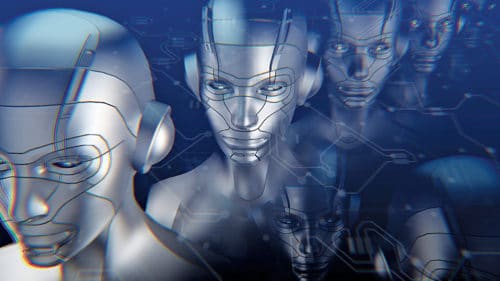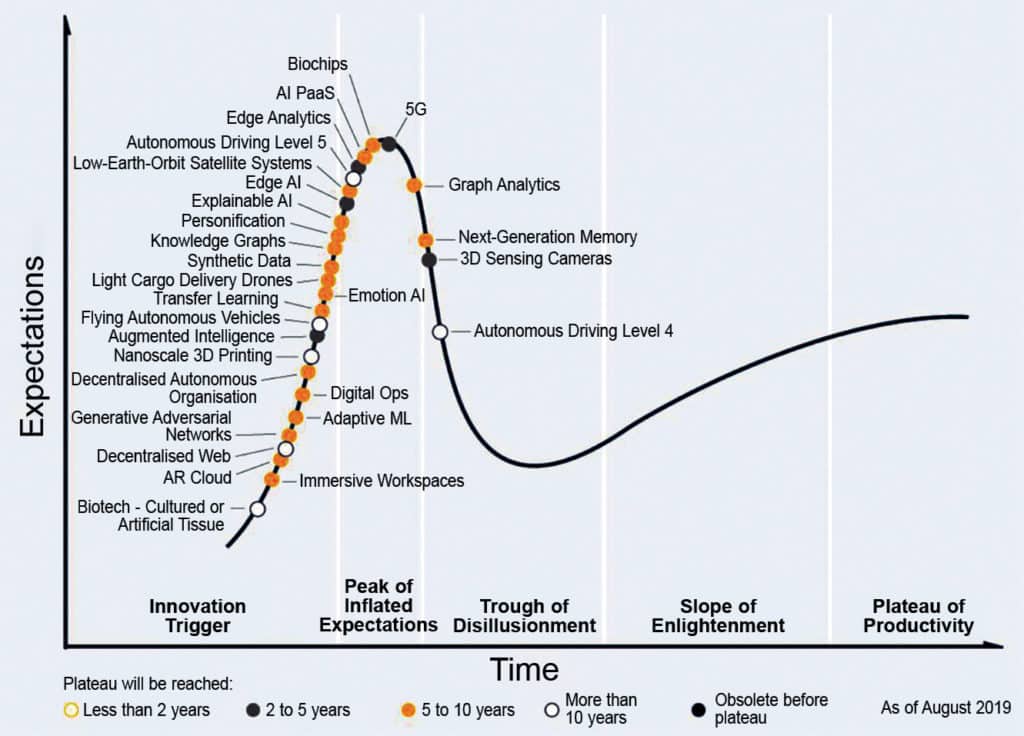Artificial intelligence (AI) is coming to a point where action, not talk, is needed. While there are fears and inflated expectations of what AI can do, much of it is hype and a far cry from what it can actually achieve today.

No doubt, artificial intelligence (AI) is the buzzword of the 21st century. Sometimes, buzzwords are important because they make a huge impact on emerging technologies and pave the way to explore new things. Many companies are rushing to be the first ones to realise the potential of AI technology. AI is already almost everywhere, and we may not even realise it. For example, Amazon’s shopping, Netflix’s recommendations, Alexa and Siri all use AI. Many insurance companies and banks are also using AI. In case these companies are not using AI now, they soon will.
These days AI is a subject that everyone seems to have an opinion on. However, this also creates confusion and misinformation surrounding this technology. There is a lot of hype in the media and some of it can be scary. So, what is hype and what is real? Let us check out some facts in this article, including technology, business and application. But before going to these facts, let us take a look at the hype cycle that provides a graphical and conceptual presentation of the maturity of emerging technologies.
The hype cycle
Hype cycle highlights the emerging technologies expected to have a significant impact on industry, business, society and individual over the next few years. Hype cycle chart from Gartner shows that there are many AI-based emerging technologies in the market. Some of the listed emerging technologies will be dropped after due course of time if they do not contribute significantly as per expectations and market demand. The chart can also be helpful for innovators and developers to work on these technologies.

AI startups
As per reports from Forbes.com, over 154,000 AI patents have been filed worldwide since 2010. Some of these companies are getting positive results and their work has paid off well. AI technology has great potential across many industries, from retail, manufacturing to energy and healthcare.
According to research firm PricewaterhouseCoopers, in 2018, billions of dollars were invested in AI companies in Europe, and the industry is projected to be worth more than fifteen trillion dollars by 2030. But not all companies that claim to use AI are telling the truth. Many are making vague claims of using AI in their products and services to secure funding or attract customers. A recent study by London-based venture capital firm MMC found that, out of 2830 European startups classified as AI companies, only 1580 accurately fit the description. It was found that forty per cent of AI startups in Europe do not actually use any AI technology.
While it is true that Indian companies are following AI technology trends, there are also reports that many of them are not working on leveraging AI technology. These so-called AI-based companies, which have received millions in funding from various sources, are reportedly relying mostly on human work force, while using the hype around AI to attract customers and investments. India has started to scale its tech entrepreneur presence in global markets but is still way behind many countries including the US, China and Israel in AI technology.
AI and robots
People often confuse AI with robots. Robots are programmable machines that are used to carry out a series of actions manually, semi-autonomously or autonomously. Many of them are not intelligent.
Whereas, AI is a branch of computer science that involves developing computer programs. For example, AI algorithms are used in Google searches, Amazon’s recommendation engine, Siri, Alexa and others. Hence, not all AI programs are used to control robots. Artificially-intelligent robots, or AI robots, are a combination of robotics and AI. These robots are controlled by AI programs.
AI without machine learning
We have come across many articles that say there is no AI without machine learning. It is also said that AI without machine learning is like a car with no engine. Is AI without machine learning possible?
Yes, it is! The heart of AI is not always machine learning. Researchers in early days found ways of creating AI without machine learning. These AI techniques are still alive and used even today.
Initially, machines were designed to formulate outputs based on inputs represented by symbols. Symbolic AI research was popular from the mid-1950s until the late-1980s. Good old-fashioned AI, or GOFAI, was based on a human-understandable symbolic system.
GOFAI was first used by John Haugeland in his 1985 book titled Artificial Intelligence: The Very Idea. It is AI without machine learning. So, behind all the hype and excitement of machine learning, there is GOFAI in the background. For example, one common use of GOFAI in today’s applications is the chatbot. Many chatbots are solely based on GOFAI, despite the immense progress of natural language processing through machine learning.
Symbols are used when input falls under certain and definite conditions. However, when there is uncertainty involved, like predictions, representation is done using fuzzy logic as seen in artificial neural networks. As we go deeper into AI, we find that machine learning is a key element in AI technology. It is mostly based on using lots of training data and good algorithms. There is also a possibility that machine learning can exist without good algorithms, but not without good data.
Individualism social phenomena
AI technology has benefited not only business but the life of every individual. AI-enabled smartphones and robots have had a huge impact on the modern society. But some experts feel that these emerging technologies also create many problems. With advancements in such technologies as mobile and AI, society is becoming something of the past. Human species live together in a society in one way or the other. Society may curb an individual’s independence but it also provides many benefits including valuable companionship.
Modern people tend to spend time alone with technology, especially emerging technologies like AI robots and smartphones. Individualism is a social phenomenon that is rapidly spreading around the world, and the number is on an increase. A report says that in the US, 28 per cent of all households have people living alone. These people believe that there is no need for another human being or companion. In the novel Robinson Crusoe, Robinson Crusoe decides to leave the island in the end. Do you think if an AI robot or smartphone was there with him, he would have returned to England at all?
Job displacement
There is a fear that AI and robotic process automation (RPA) will displace tens of millions of jobs in the US. That is, work as we know it today will not exist for many people, including retail stores, truck drivers and others. Technology will continue to advance, taking over even more jobs.
There have been similar fears with other technologies as well. Advent of the personal computer (PC) in the 1980s led to widespread fear that computers would lead to mass unemployment. On the contrary, computers created more jobs.
Take the classic case of an automated teller machine (ATM). While human bank tellers per bank have decreased, ATMs have helped reduce the cost of opening new bank offices in general, so the number of bank offices have increased, which, in turn, has resulted in hiring more bank-related workers and therefore more bank tellers. However, job description of bank tellers has changed—it focuses more on handling customer relations from previous routine tasks that are now automated.
Same is the case with predictions based on AI. Many experts feel that there is nothing to fear. It is because the number of jobs created by AI and automation in general will likely outnumber the jobs displaced. The only doubt is whether the displaced workers will have the capabilities to do these new jobs.
AI surveillance
New technologies can improve our lives, but such technologies as AI surveillance come with many privacy concerns. For example, AI surveillance systems are installed everywhere in China. These AI-based face-recognition systems are used by the government to supervise the lives of its citizens. AI algorithms decide certain benefits in society as per social credit scores. For example, citizens having high credit scores do not need to pay deposits at hotels and can easily obtain visas to travel abroad. Meanwhile, those with low credit scores cannot easily eat in restaurants, register at hotels, purchase products or travel freely.
Technological singularity
As per Wikipedia, technological singularity (or singularity) is a hypothetical point in the future when technological growth becomes uncontrollable and irreversible, resulting in unfathomable changes to human civilisation. It is related to intelligence explosion, an upgradable intelligent agent such as a robot with artificial general intelligence that would enter self-improvement cycles, continue to upgrade itself and advance technologically at an incomprehensible rate, resulting in a powerful super intelligence surpassing all human intelligence.
Some experts say that there is a possibility to achieve singularity within this century, while others say that singularity is a matter of belief, not science. However, it no longer seems beyond the realm of possibility. As of now, the subject is quite divisive, and consequences of singularity and its potential benefits or harms to the human race are being intensely debated.
Conclusion
It is true that AI has achieved some amazing feats including beating humans at various games, self-driving cars, cancer detection in humans and others, but the reality is that AI still has a long way to go. AI robots are nowhere near achieving the level of human intelligence, but a lot of progress has been made with limited AI algorithms during recent years.
While some news on AI is true, many are just hype. As such, there is nothing to fear, just brace yourself and welcome the new and emerging technologies, and try to make use of AI in the most beneficial way.








